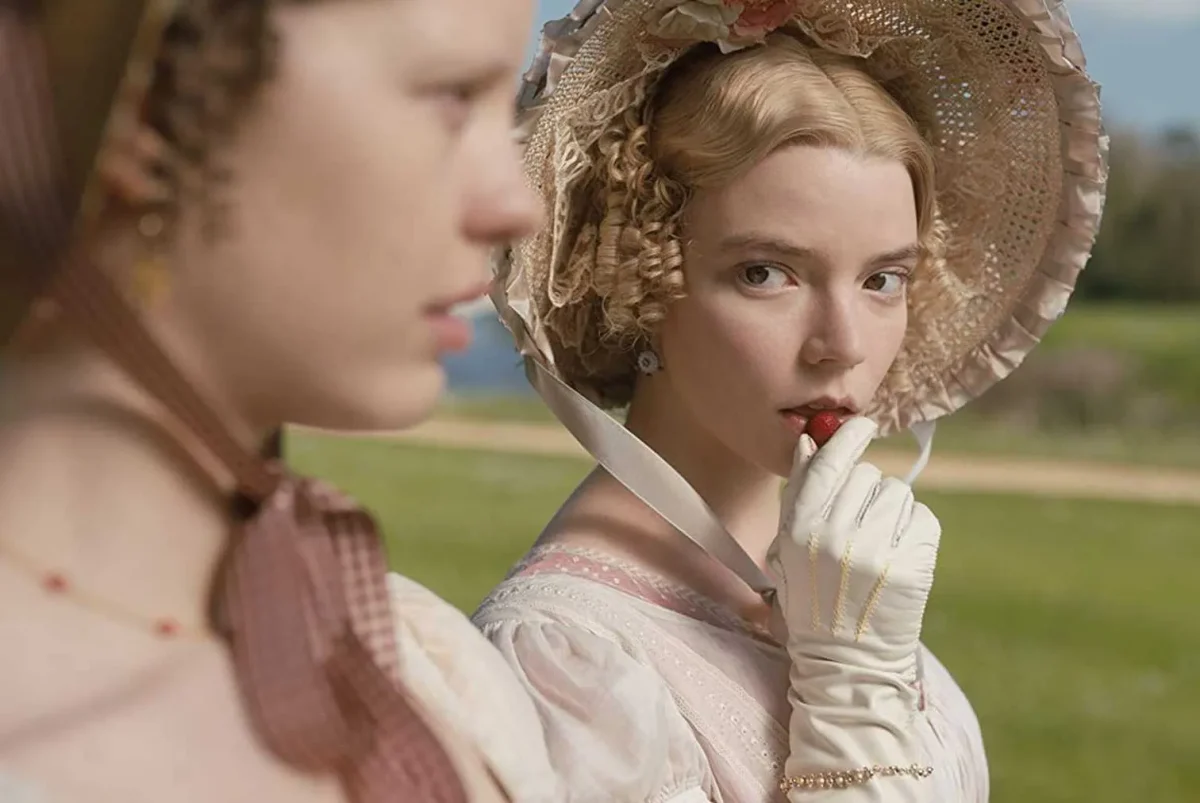Emma by Jane Austen, published in 1815, is perhaps the most divisive of her novels. While still regarded as literary genius and a classic, opinions on the book as a whole tend to vary greatly from person to person with either loving the book or hating it. I– however– am part of the former. Emma is the first Jane Austen novel that I read, all the way back in February of 2024. This is when I was still new to classics, so the language seemed almost foreign and impossible to decipher. I knew it was supposed to be a comedy, but I just wasn’t laughing. So, I put it down until that summer. A few months later, I flew through Emma, and it was an absolute delight to read.
So, I have to admit, I was extremely surprised that people did not enjoy this novel. After all, the plot is just pure 1800s gossip. In addition, the story is extremely famous outside of the bounds of the book. Countless film adaptations have been made, and the iconic 90s chick-flick Clueless is based on it. The plot of the novel is simple: Emma Woodhouse indulges in the act of matchmaking– setting up all of her friends (and even her enemies) for enjoyment and entertainment. What once started as a fun hobby turns into multi-level drama, even protruding into Emma’s personal relationships. But criticism of this novel has become more and more prominent in recent years, especially on the feminism aspect of the novel. While I recognize these takes, I am here to provide an alternate perspective. These are just my opinions on the strengths of this novel, so please take them as such.
One strength of the novel is its characters. The cast is fairly large, but each character has an extremely distinct personality that is always prominent (even if these personalities border on pandering and annoying– I’m looking at you, Miss Bates). The way that each character has a history with one another really immerses you in the world of the story. It feels like these characters have been around much longer than the limits of the book. It makes the story feel real and almost lived in, which is something I really appreciate for the small town atmosphere of the book.
It is within these relationships that we can begin to see ideas of female empowerment, especially for the time. This book takes place in the regency era, a stifling time (especially in England) for women. The acts of “feminism” in this book may not seem like much– especially to our standards for today– but for the time they were seen as revolutionary.
The first being Emma Woodhouse’s demeanor. She is prying, petty, and fickle– characteristics that were seen as improper at that time for a woman. She is actively involved in the love lives of others while neglecting her own. At several points within the book she declares she will never be married (even if this does not end up true), and repeatedly rejects advances from possible suitors. When Emma does eventually marry, she marries for love and she marries a man who is willing to give up his estate. This would be unprecedented at the time, even scandalous.
This desire to defy societal expectations is present all over the story. Most notably is Emma’s mentorship of Harriet Smith. However misguided her views are, Emma wants more for Harriet than the life she has, encouraging her to marry up in the world than to settle. Also on the topic of Harriet, I’d argue that the relationships in Emma are more female focused than male focused. While in other books of the time, there’s always romantic pining between two parties. However, Emma showcases female friendships, especially between Emma and Harriet and Emma and Miss Taylor. The book even portrays female rivalry between Emma and Jane Fairfax. In the media today, even, rivalry between women is seen as catty. I believe that showing this jealousy that Emma harbours is important to creating a well rounded and strong female character.
In addition, each of these female characters (while some of them are married) are not defined by their husbands or suitors like other books of the time. Each woman has distinct strengths and weaknesses– weaknesses that stifle them in a human way. Additionally, each of the characters are able to overcome their weaknesses. My favorite example comes at the climax of the book, when Emma makes a snide remark at Miss Bates. No matter how warranted I think this remark was, it was done distastefully, and showed a gaping– yet intentional– weakness in Emma’s character. In addition, her matchmaking schemes have caught up to her, causing a rift between herself and Harriet.
From the Emma that I described in the previous commentary, it might seem like she would brush this off, breeze past it. But it actually weighs on her. She is told off by most everyone, including Mr. Knightly in one of the most iconic scenes of the book (“Badly done, Emma!”). From this, she learns from her mistakes. She isn’t forced to apologize, especially considering her status sits above that of Miss Bates and Harriet, but she does. It shows real strength in her character, her seemingly petty facade falling away into care for the people around her.
In a modern world where entitlement is common, I think that we can learn a lot from Emma. Even as high schoolers blooming into adulthood. I think the message here is to not confuse entitlement with confidence, and when that mistake is made, to accept and learn from it with grace. It’s a beautiful yet simple lesson that we can all take something from. Emma by Jane Austen portrays this perfectly, highlighting the ways that females are commonly looked down upon for these acts that are considered “normal” for men, especially at the time the book was published. Sure Emma Woodhouse is a spoiled girl living in the lap of luxury, but by the end of the book she has transcended that. I think that this is why the book is considered the classic that it is. Its feminism is more subtle, portrayed in a way that differs completely from the way we think of the concept of feminism today.
Emma is a book that I have sincerely grown to love, and it’s a book that I keep coming back to for a lesson that’s worth telling, even if it was published over two-hundred years ago.










